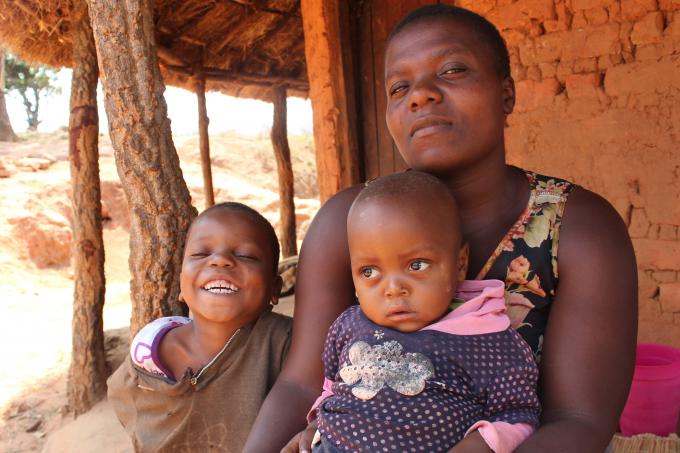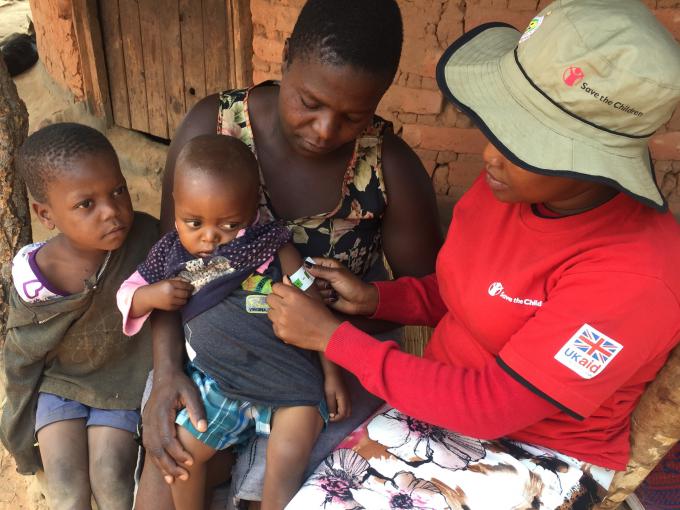Supporting communities to fight Malnutrition

When Simon first got sick, his mother took him to a hospital in Mutare where the nurses suspected Malaria and he was given medication. However, when they returned home in Chipinge, his condition did not get any better.
“After visiting the hospital, my son’s health did not improve, the diarrhea continued, he could not even eat properly. This continued for three months and I thought I was going to lose him,” said Simon’s mother.
In July, Grace took her baby for regular health checkups conducted by James Dziro, a Village Health Worker (VHW) who had just been trained on Community Growth Monitoring and given equipment to use for active screening for Malnutrition by Save the Children. The child was screened for malnutrition and the VHW noticed signs of Severe Acute Malnutrition (SAM) and referred the case to Paidamoyo clinic for further screening.
“I took my son for weighing which is done by Sekuru (VHW) and he told me that my son required immediate medical attention as he was under nourished and he wrote a note which he told me go with to the clinic so that I get assistance.Getting to Paidamoyo clinic, nurses ran further tests and detected that the baby was suffering from SAM. Grace was referred to the District Nutrition Coordinator, Karen Mudewe who works on child nutrition cases within the district with support from Save the Children.
“After Simon was diagnosed with SAM he was immediately admitted for treatment and he was given medicine as well as Plumpy nut. I started working with his mother to ensure that he recovers. I had a discussion with her asking her about her breastfeeding and complimentary feeding practices. Through the interactions I had with Simon’s mother, I found out that she had stopped breastfeeding her child at 14months and she did not feed her child with a variety of foods with different nutrients.
The baby was only fed with porridge in the morning, sweet potatoes in the afternoon and sadza and vegetables in the afternoon and all these practices were not good for the baby’s health. “I urged Simon’s mother to create a meal plan where she feeds her child with foods consisting of all the nutrients. We also spoke about the importance of good hygiene practices so that the child is protected from diseases,” Karen explained.
The sessions Grace had with Karen helped her in ensuring her son’ recovery as she managed to adopt the good feeding practices she had been taught. Simon is now a healthy child and Grace is forever grateful for the assistance.
“From the time I started practicing what I was being taught, I noticed a change in my child health. His skin went back to normal, his eyes are now bright and he now spends the day playing with other children."
“Sister Karen saved my son’s life. If it wasn’t for her, I could have lost him. I realised that I wasn’t taking good care of him. I now give him a variety of foods which include porridge with peanut butter, milk, avocados, oranges, meat and eggs."
“I encourage all mothers to feed their children with foods which consist of all nutrients and to adopt good hygiene practices so that their children do not get sick,” said Grace.

Since the Cyclone Idai disaster affected Chipinge, seven cases of SAM have been handled at Paidamoyo Clinic. According to the District Nutrition Coordinator, the main causes of cases handled were attributed to lack of knowledge, poor feeding practices, poor hygiene and limited food sources since community nutrition gardens were swept away by Cyclone Idai.
 Zimbabwe
Zimbabwe